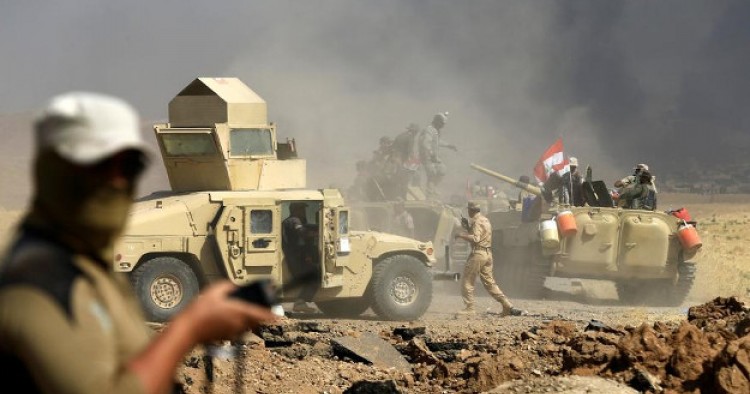The liberation of Tal Afar is a “major defeat for America and terrorists” and paves the way for the expulsion of U.S. Troops from Iraq, says an article in hardline Javan Online, a mouthpiece of the Islamic Revolution Guards Corps (I.R.G.C.). The author says the Popular Mobilization Forces – the Iraqi paramilitary forces also called Hashd al-Shaabi – played a key role in the Tal Afar operation and credits Iraqi Prime Minister Haider al-Abadi for not “succumbing to U.S. pressure” and allowing the P.M.F. to participate in the offensive. The article reiterates the conspiracy theory often expressed by Iranian officials and media outlets that the U.S. military is seeking to prevent a total defeat of the Islamic State in order to justify its presence in Iraq. “The biggest loser of the Tal operation and this victory is the United States of America,” it adds.
The author explains that Tal Afar is one of the most strategic cities in Iraq because of its proximity to the Syrian and Turkish borders.
“In addition to the defeat of America and terrorists in the Tal Afar operation, the real winner of this great battle is the Iraqi government. The government first did not surrender to American pressure to bar the popular forces from participating in the Mosul and Tal Afar operations, and it strongly protected this great asset. It also guaranteed Iraq’s future security by forging unity between the army and the Hashd al-Shaabi forces. And this is the initial step by the Iraqi government and people to evict the American forces and establish security with the help of domestic capacities, particularly the popular forces,” it concluded.
Comment: The Iraqi military said on Sunday that it has recaptured almost all of Tal Afar, the Islamic State’s last major urban stronghold in northwestern Iraq. Despite concerns raised by Iraqi Sunnis and regional Sunni governments, Iranian-backed P.M.F. groups played an active role in the operation. The U.S.-led coalition also provided support to the Iraqi security forces in the offensive. The Tal Afar operation was the latest example of the U.S.-led coalition and Iranian-backed groups operating as de facto allies in the fight against the Islamic State.
However, as the common foe is ousted from its major Iraqi strongholds, including Mosul and Tal Afar, the I.R.G.C. and its Iraqi proxies have stepped up propaganda against the U.S. and its regional allies – which poses risks to U.S. military advisers helping the Iraqi security forces and also complicating post-conflict governance and reconciliation efforts at local and national levels in Iraq. As the article in Javan Online indicates, the I.R.G.C.’s primary goal now is to force the United States to withdraw its troops from Iraq. Tehran has made its position clear to Baghdad that it opposes the presence of American troops in Iraq after the battle war against the Islamic State is over. When Iraqi Prime Minister Haider al-Abadi was visiting Tehran, Supreme Leader Ali Khamenei made two key propositions to him: to expel the U.S. forces and not to dissolve the P.M.F. after the Islamic State’s defeat. Iranian-backed P.M.F. groups have also begun to implicitly and explicitly threaten the U.S. forces in Iraq.
On August 1, Qais al-Khazali, the secretary-general of Iraq’s Asaib ahl al-Haq armed group, accused the United States, Israel, Saudi Arabia and Turkey of supporting the Islamic State in Iraq and the broader region, according to Iran’s Fars News Agency. “The heroic forces of Hashd al-Shaabi [Popular Mobilization Forces] easily chop the heads of these forces,” he said while describing the Islamic State as the “special forces” of the United States and its allies. Khazali has reportedly pledged allegiance to Iran’s Supreme Leader Ali Khamenei, and his group takes orders from I.R.G.C. Quds Force Commander Qassem Soleimani, rather than the government in Baghdad. This is despite the fact that AAH is part of the Popular Mobilization Forces (P.M.F.), which has been incorporated into the Iraqi security forces. Khazali was arrested by the U.S. military in 2007 for his alleged role in high-profile attack in Karbala that had killed five American service members. But he was released two years later along with other AAH members – apparently in an exchange for a British hostage. The U.S. and British government denied it was a prisoner exchange.
Similarly in March, a spokesman of Iraq’s Popular Mobilization Force (P.M.F.), accused the U.S. military and intelligence of supporting the leader of the Islamic State and trying to rescue terrorists trapped in western Mosul. “Abu Bakr al-Baghdadi is a protégé of America. His actions and movements are supervised by this country’s [U.S.] intelligence service,” Ali al-Husseini, who is also a commander of Iraqi Shiite militia group al-Hashd al-Turkmani, said an exclusive interview with I.R.G.C.-affiliated Tasnim News Agency. “Al-Baghdadi is an American puppet, and this is undeniable. I believe Americans know where he is but they hide him,” he continued. The militia leader further alleged that American forces in Iraq were trying to transfer Islamic State fighters from Iraq to Syria and Libya.
The Middle East Institute (MEI) is an independent, non-partisan, non-for-profit, educational organization. It does not engage in advocacy and its scholars’ opinions are their own. MEI welcomes financial donations, but retains sole editorial control over its work and its publications reflect only the authors’ views. For a listing of MEI donors, please click here.













